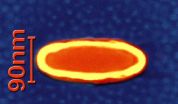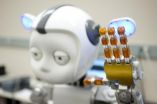(Press-News.org) A group of researchers from EPFL's Global Health Institute (GHI) and Inserm (Institut National de la Santé et de la Recherche Médicale, the French government agency for biomedical research) has discovered that a class of chemotherapy drugs originally designed to inhibit key signaling pathways in cancer cells also kills the parasite that causes malaria. The discovery could quickly open up a whole new strategy for combating this deadly disease.
The research, published online in the journal Cellular Microbiology, shows that the malaria parasite depends upon a signaling pathway present in the host – initially in liver cells, and then in red blood cells – in order to proliferate. The enzymes active in the signaling pathway are not encoded by the parasite, but rather hijacked by the parasite to serve its own purposes. These same pathways are targeted by a new class of molecules developed for cancer chemotherapy known as kinase inhibitors. When the GHI/Inserm team treated red blood cells infected with malaria with the chemotherapy drug, the parasite was stopped in its tracks.
Professor Christian Doerig and his colleagues tested red blood cells infected with Plasmodium falciparum parasites and showed that the specific PAK-MEK signaling pathway was more highly activated in infected cells than in uninfected cells. When they disabled the pathway pharmacologically, the parasite was unable to proliferate and died. Applied in vitro, the chemotherapy drug also killed a rodent version of malaria (P. berghei), in both liver cells and red blood cells. This indicates that hijacking the host cell's signaling pathway is a generalized strategy used by malaria, and thus disabling that pathway would likely be an effective strategy in combating the many strains of the parasite known to infect humans.
Malaria infects 250 million and kills 1-3 million people every year worldwide. Efforts to find a treatment have been marred by the propensity of the parasite to quickly develop drug resistance through selection of mutations. Once in the body, it hides from the immune system inside liver and blood cells, where it proliferates. The discovery that the parasite hijacks a signaling pathway in the host cell opens up a whole new strategy for fighting the disease. Instead of targeting the parasite itself, we could make the host cell environment useless to it, thus putting an end to the deadly cycle. Because this strategy uniquely targets host cell enzymes, the parasite will be deprived of a major modus operandi for development of drug resistance - selection of mutations in the drug target.
Several kinase-inhibiting chemotherapy drugs are already used clinically, and many more have passed stage 1 and stage 2 clinical trials. Even though these drugs have toxic effects, they are still being used or considered for use over extended periods for cancer treatment. Using them to combat malaria would involve a much shorter treatment period, making the problem of toxicity less acute. The authors of the study suggest evaluating these drugs for antimalarial properties, thus drastically reducing the time and cost required to put this new malaria-fighting strategy into practice.
### END
Malaria's weakest link
2011-03-09
ELSE PRESS RELEASES FROM THIS DATE:
Study: Homeless patients cost $2,500 more than the average patient for each hospital stay
2011-03-09
TORONTO, ON., March 8, 2011—Homeless patients cost about $2,500 more per hospital stay than the average patient, according to a new study by researchers at St. Michael's Hospital.
Homeless people with medical or surgical problems arrive at the hospital with underlying health issues and stay longer than others, often because there is no place to send them after their initial medical crisis has been treated, the study found. Those with psychiatric illness arrive at the hospital much sicker than others.
The findings suggest the cost of hospitalizing people who are homeless ...
Extremely fast MRAM data storage within reach
2011-03-09
This release is available in German.
Magnetic Random Access Memories (MRAM) are the most important new modules on the market of computer storage devices. Like the well known USB-sticks, they store information into static memory, but MRAM offer short access times and unlimited writing properties. Commercial MRAMs have been on the market since 2005. They are, however, still slower than the competitors they have among the volatile storage media. An invention made by the Physikalisch-Technische Bundesanstalt (PTB) changes this situation: A special chip connection, in association ...
How can robots get our attention?
2011-03-09
Getting someone's attention can be easy with a loud noise or a shout, but what if the situation calls for a little more tact? How can a robot use subtle cues to attract a human's notice and tell when it has captured it? In a preliminary study, researchers at the Georgia Institute of Technology have found that they can program a robot to understand when it gains a human's attention and when it falls short. The research is being presented today at the Human-Robot Interaction conference in Lausanne, Switzerland.
"The primary focus was trying to give Simon, our robot, the ...
Earth: Alive -- bacteria back from the brink
2011-03-09
Alexandria, VA – In 1993, "Jurassic Park" thrilled the world with the idea that dinosaurs could be resurrected from bits of DNA preserved in mosquitoes trapped in ancient amber. In the 18 years since the movie came out, scientists have been finding that parts of this scenario are closer to reality than anyone ever imagined: Researchers have found microbes living for tens of thousands - and maybe millions - of years inside salt crystals.
These findings raise exciting questions, as EARTH explores in "Bacteria Back From the Brink" in the April issue. Could these hibernating ...
Eating disorders and body dissatisfaction is double in Muslim teenagers than in Christian
2011-03-09
This release is available in Spanish and French.
The incidence of eating disorders was found to be 2.3-fold higher among Muslim adolescents than among their Christian classmates. Similarly, body dissatisfaction was 1.8-fold higher in the former group. Finally, as a general conclusion, an average of one in four adolescents suffers some type of eating disorder, and 15% suffers body dissatisfaction. These were the conclusions drawn of a research conducted at the University of Granada.
The sample was taken from a Spanish multicultural city, Ceuta, where different religious ...
Migrating moths and songbirds travel at similar rates
2011-03-09
A study published today (09 March) in Proceedings of the Royal Society B by researchers at Rothamsted Research (an institute of the Biotechnology and Biological Sciences Research Council), and the universities of Lund (Sweden), Greenwich and York, reports the surprising finding that night-flying moths are able to match their songbird counterparts for travel speed and direction during their annual migrations but they use quite different strategies to do so - information that adds to our understanding of the lifestyle of such insects, which are important for maintaining ...
University of South Florida researchers find blood-brain barrier damaged by disease
2011-03-09
A study into the effects of Sanfilippo Syndrome type B (MPS III B) has found that the barrier responsible for protecting the brain from the entry of harmful blood-borne substances is structurally and functionally damaged by the devastating disease. University of South Florida researchers identified damage in specific brain structures involved in the pathology of MPS III B, one of four Sanfilippo syndromes, all of which are inherited diseases of metabolism.
The study, using a mouse model of MPS III B, has been published online in the journal PLoS One. Before this study, ...
Cancer in HIV-positive patients
2011-03-09
Most HIV-positive patients die of cancer. In the latest issue of Deutsches Ärzteblatt International (Dtsch Arztebl Int 2011; 108[8]: 117), Manfred Hensel's research group presents epidemiological data.
The authors surveyed all German hospital outpatient clinics and ambulatory care centers specializing in the treatment of HIV patients in the period from 2000 to 2007 and were thus able to analyze the largest collection of data on the incidence of cancer in HIV patients ever assembled in Germany. It first became clear in the early 1980s that HIV infection is associated ...
Boston researchers create 'SMArt' platform architecture, launch $5,000 health app competition
2011-03-09
Boston, Mass. – Through a grant from the Office of the National Coordinator for Health Information Technology (ONC), researchers at Children's Hospital Boston and Harvard Medical School have developed a first-of-its kind platform architecture to support a flexible health information technology (IT) environment and promote innovation. The SMArt (Substitutable Medical Applications, reusable technologies) platform and interface are being made publicly available today to kick off the start of a $5,000 competition challenging developers to create web applications that provide ...
Research finds open-source software is actually more secure for health care IT
2011-03-09
Globally the sale of health care information systems is a multibillion dollar industry. The vast costs, frequent failed systems, and inability of systems to talk to each other regularly attract media comment. However policy makers still shy away from a class of software, Open Source, that could address many of these problems, because of worries about the safety and security of Open Source systems. Now new research by the University of Warwick's Institute for Digital Healthcare, and the Centre for Health Informatics and Multiprofessional Education at UCL Medical School, ...

